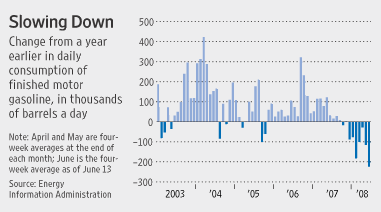WSJ
Lofty energy prices and a weak economy have combined in the past year to rein in U.S. gasoline consumption in what many experts believe will be an enduring shift in the way our nation burns fuel.
As gasoline prices continue climbing, demand has been heading in the opposite direction. So far this year, Americans have used less gasoline than they did in 2007, with demand since January dropping 1% from last year, according to the Department of Energy.
Light, sweet crude for July delivery fell 3.5%, or $4.75 a barrel, Thursday on the New York Mercantile Exchange to $131.93.
During the energy crunch of the late 1970s and early 1980s -- the last time gas prices were close to current levels in inflation-adjusted terms -- consumers sharply cut back their gas consumption. When prices dropped, demand rose again, but at a slower pace because of the embrace of more-fuel-efficient foreign cars.
This time around, the breadth of change in consumption patterns is even more dramatic, and, if oil prices stay near current levels, the decline in demand could be more sustained.
The slower economy means pinched consumers, as well as truck drivers delivering goods, are driving less. DOE economists estimate that a 1% decline in personal income results in a 0.5% drop in gasoline demand.
Higher prices at the pump -- where last week the nationwide average for a gallon of gas topped $4 for the first time -- have prompted consumers to make changes that have both a short-term and long-term impact. Behavioral changes, such as driving less or taking public transportation, could be easily reversed if gasoline prices ease.
But the steep run-up in oil prices and the prospect of them remaining high has prompted consumers, industry and lawmakers to make bigger, longer term changes that could reduce consumption for decades. Drivers are buying smaller cars, legislators are enforcing stricter rules on fuel efficiency, the market for alternative fuels is growing and people are shunning the far-flung suburbs to live closer to where they work.
A report by Cambridge Energy Research Associates, an energy-consulting group, says 2007 probably will represent the peak year of gasoline consumption in the U.S., with annual demand dropping this year for the first time in 17 years.
"All signs point downward from here," says Samantha Gross, associate director of CERA's global oil-research group and one of the report's authors. Gas prices have been high long enough for consumers to see them as "something that's here to stay."
Judy Bayer, who works for a mortgage company, is coping with higher prices for gas by giving up outings to the movies, the mall and restaurants. "I don't leave my house. I go to work, and I come home," says the 45-year-old Webster, N.Y., resident.
But the impact of other changes, according to CERA researchers, is just beginning to show up in the data. Federal mandates dictating that vehicles get more miles from every gallon of gasoline will result in a lighter and more-fuel-efficient fleet in coming years, even if oil prices collapse, says Aaron Brady, director of global oil research at CERA.
Concerns about global warming are raising awareness among both consumers and government leaders about cutting fossil-fuel consumption, with the result that "efficiency is going to remain at the forefront for policy makers for the foreseeable future," said Mr. Brady.
Dean Hemstreet, a software engineer, improved his mileage by replacing his old car, a mid-1990s Chrysler sedan that gave him 17 miles a gallon, with a Hyundai Elantra, which gets 32 miles a gallon. "The gas prices were killing us," he said. Mr. Hemstreet, who lives in a suburb of Salt Lake City, said he intends to keep his new car for about eight years.
Meanwhile, people have begun migrating from far-flung suburbs to urban centers where commuting distances are shorter and public transit is more easily accessed. In a poll this month of more than 900 Coldwell Banker residential-real-estate agents mainly in urban markets, more than 70% of them said their clients increasingly are interested in living in the city to shrink their gasoline bill.
"The McMansion in the half-finished subdivision in a distant suburb has become the equivalent of the large SUV that people can't unload," says David Goldberg, spokesman for Smart Growth America, a group that advocates for more compact, walkable communities.
Fewer fill-ups in the U.S. are unlikely to significantly dent the price of gasoline as long as oil prices stay high, experts say. And though Americans are by far the biggest consumers of oil in the world, growth in the developing world is expected to continue fueling high energy prices.

The numbers for weekly gasoline consumption are here, and the numbers for weekly gas prices are here. An enterprising person with more patience than I could calculate the price elasticity of demand for gasoline with these numbers. It would be interesting to use that to get a quantitative prediction for how US society will respond to the plateau, increasing price, and eventual decline in supplies.